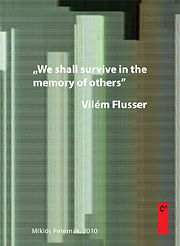Because the surface on which this text appears is technical material, and all technical material is a record of human relations, it cannot be neutral, because relationships are not neutral. I would not argue that these relationships are so many and infinitesimal that they 'even out' into a generalizable history. I want to be 'Infinitely Demanding
Vilém Flusser does not explicitly discuss the materiality of the digital surface, but he analyzes what he calls the 'technical image' as a projection from the level of code. He exhorts us to learn about how this written code functions to generate images, or else become enamoured of the digital image and mere subject to its power. He warns us not to delude ourselves about how much agency we actually have when we are imagine ourselves as 'being creative' with technical images.
"the first photographers had no idea what they were doing. They had no idea that it is the apparatus that takes the images. That the photographer is not necessary, that you can make automatic cameras, that it is so to speak technology, and science itself that makes images."1
1 from an interview, made in München, the 17th of October 1991. This written text is based on the edited tape entitled The Philosopher of Photography, broadcast by the Hungarian Television in May, 1992. (45 min, FRÍZ Production, directed by Miklós Peternák, András Sólyom, Producer: Judit Kopper)












